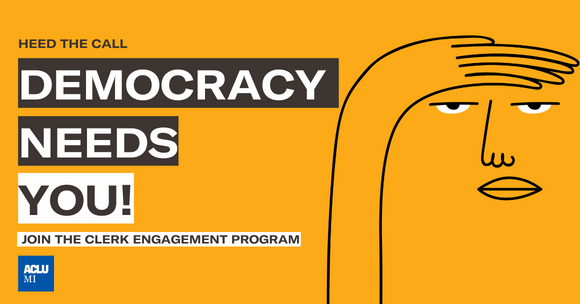By: Kammy Olive, Clerk Engagement Volunteer
In 2016, I made a decision to put my money where my mouth is. I saw my online community making posts spreading misinformation – and others asking what they could do, how they could get involved to protect our democracy from behind their keyboards. I knew I had to show my kids that I could do more than argue with people online.
So, I stepped away from the computer and volunteered with the ACLU of Michigan.
At first, I didn’t know quite what the organization did, but once I learned, I was eager to get involved. First, I went door to door in Livonia canvassing to protect abortion rights—and as you know, we succeeded! Then, I wanted to do more. Now, I’ve found a group that is working every day to ensure our families, friends and neighbors know how to vote and have equal access to the ballot box.
I am a volunteer with the ACLU of Michigan’s Clerk Engagement Program. What this means is we connect with our local clerks to learn how our elections operate. By fostering this critical relationship volunteers like me help clear barriers to the ballot box, fight disinformation, and ensure our elections run smoothly and securely. Far too few know the ins and outs of how our elections work. The increased transparency I’ve found as a volunteer and as a poll worker has helped me better understand the mechanics. I've educated myself for those that can’t – or won’t. Now, it’s my mission to share this knowledge with my community. If I want to set someone straight, I want to know what I’m talking about.
Actively watching and participating in the electoral process on Election Day and beyond has been a concrete way for me to participate in our democracy. I am doing something and showing others that we can and must do more than just click away on my keyboard and post on Facebook.
With the threat of those who want to undermine our democracy and take away our rights, we need more folks willing to actively engage in our democratic processes. It can be as easy as signing up to work on Election Day or volunteering with the ACLU’s Clerk Engagement program. You can, too – grab a friend and show up for your community this election year. You won’t regret it.
Date
Wednesday, August 28, 2024 - 2:45pmFeatured image
